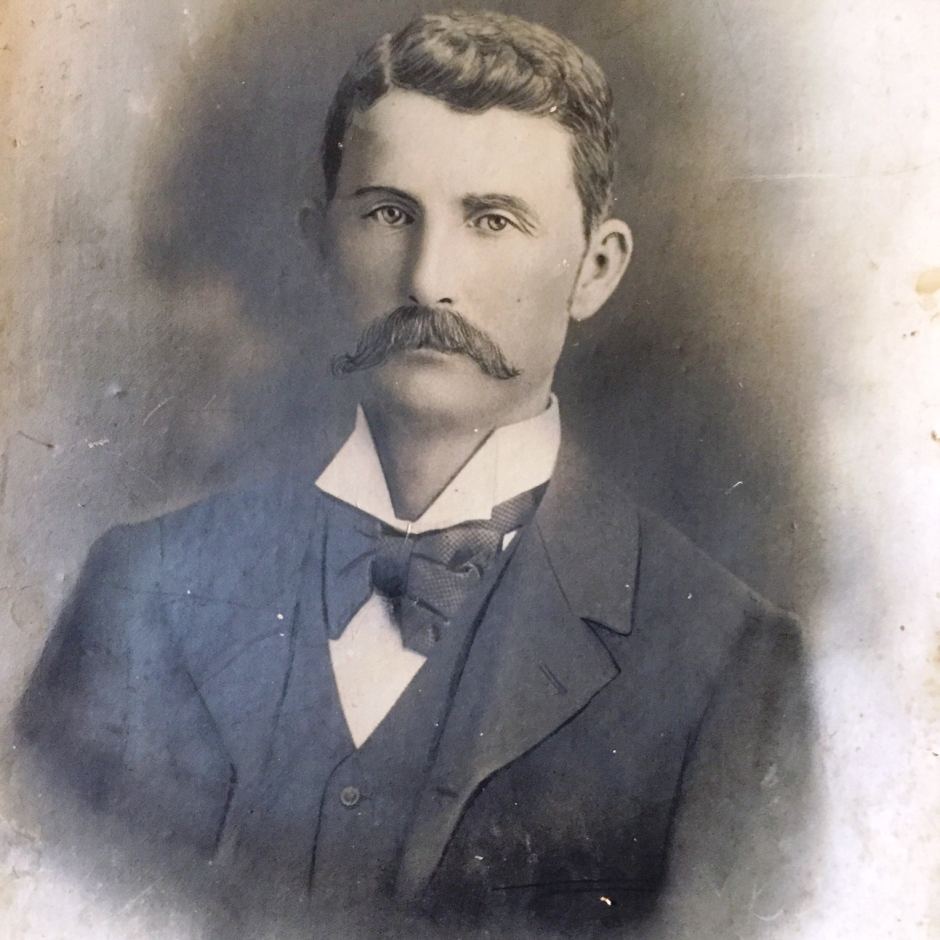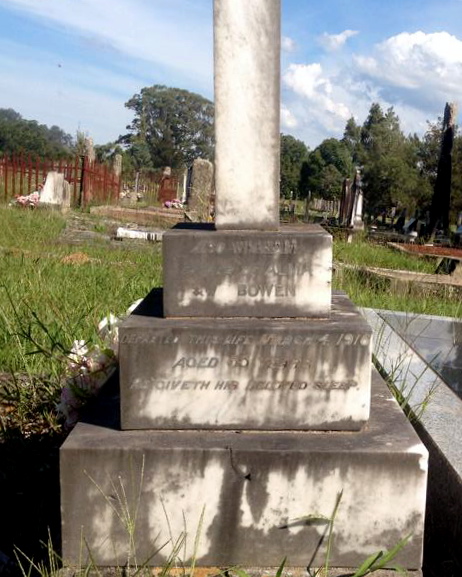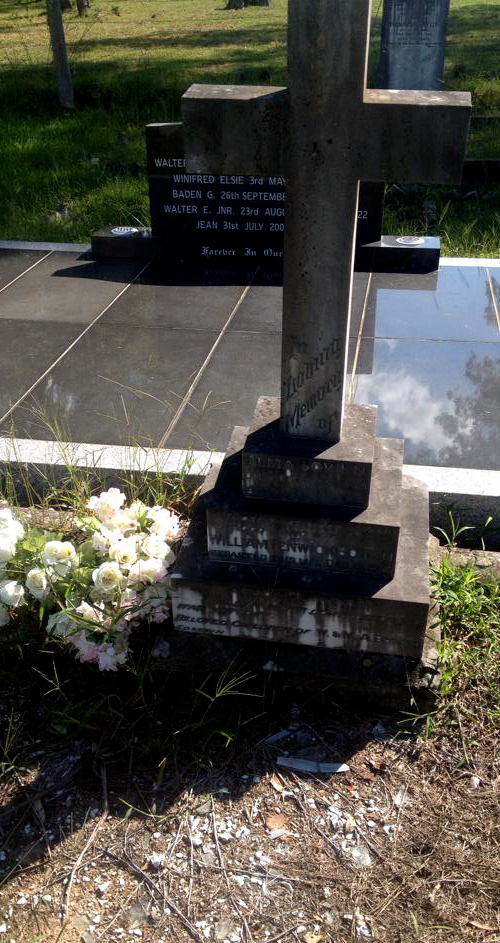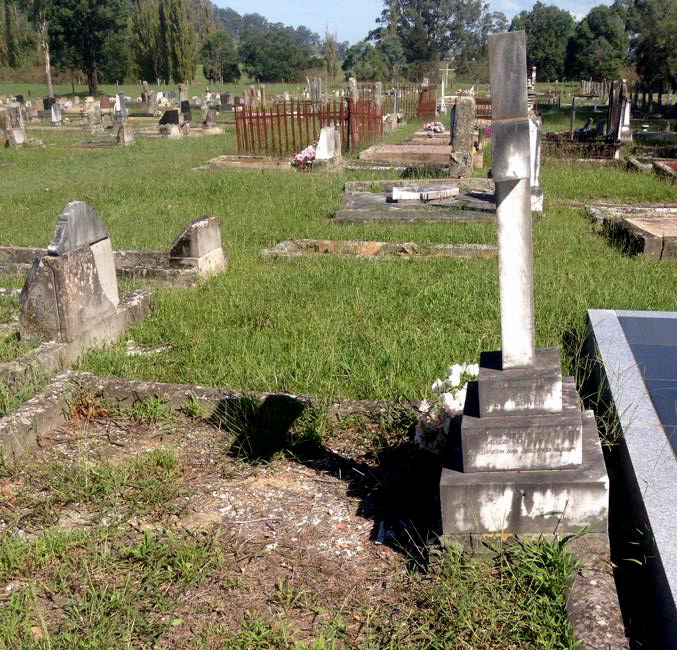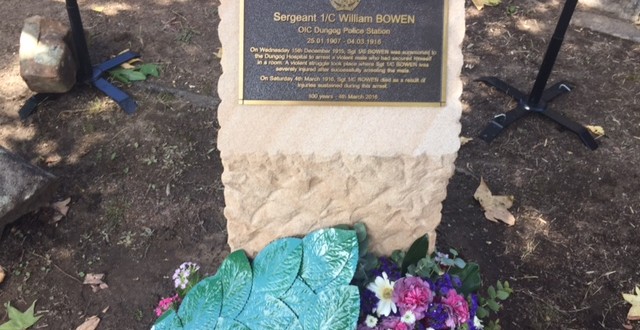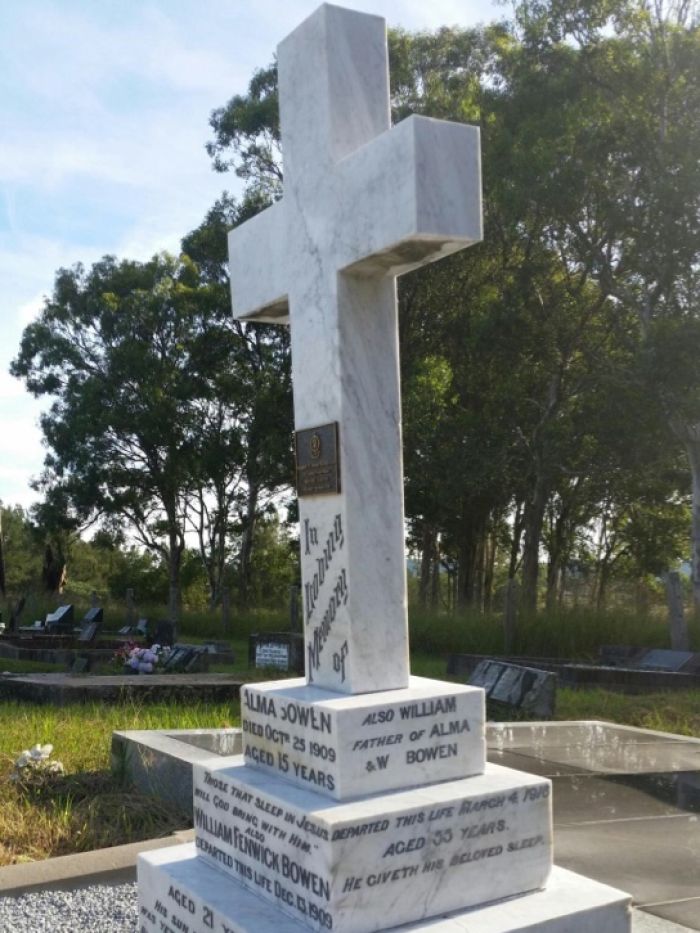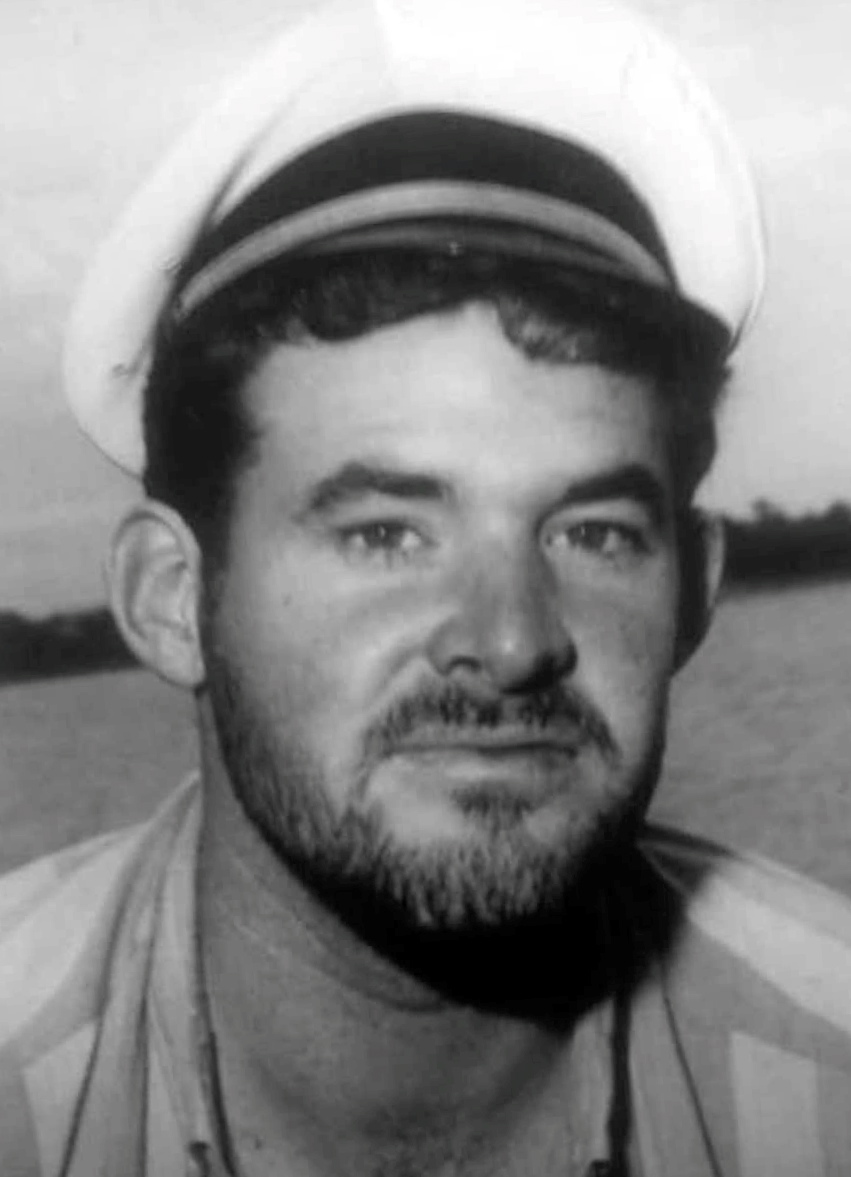William BOWEN
William BOWEN
( late of Dungog )
New South Wales Police Force
Regd. # ‘Q‘ 5316
For the purposes of this website ‘Q‘ represents those Police joining between 1 March 1862 ( commencement of NSWPF ) – 23 February 1915 ( Commencement of NSWPF current numbering system )
Rank: Probationary Constable – appointed 14 January 1887
Sergeant 1st Class – appointed ? ? ?
Stations: Gloucester, Paterson, Minmi, and other places & Dungog ( 9 years to death ) ( Port Stephens LAC )
Service: From 14 January, 1887 to 4 March 1916 = 29+ years Service
Awards: ?
Born: ? ? 1859 at Uralla, NSW
Died on: Saturday 4 March 1916
Cause: Assault – Murder?
Event location: Dungog, NSW
Event date: ? January 1916
Age: 55
Funeral date: Sunday 5 March, 1916
Funeral location: Church of England cemetery, Dungog, NSW
Buried at: Church of England cemetery with his only son & youngest daughter, Alma
Dungog Cemetery,
Tabbil Creek, NSW,
3 references for the grave
Latitude: -32.419403
Longitude: 151.738657
GPS: -32 25.16418, 151 44.31976
-32.418649, 151.738825
Memorial: Memorial & Plaque unveiling at Dungog Police Station on 4 March 2016
WILLIAM IS mentioned on the National Police Wall of Remembrance
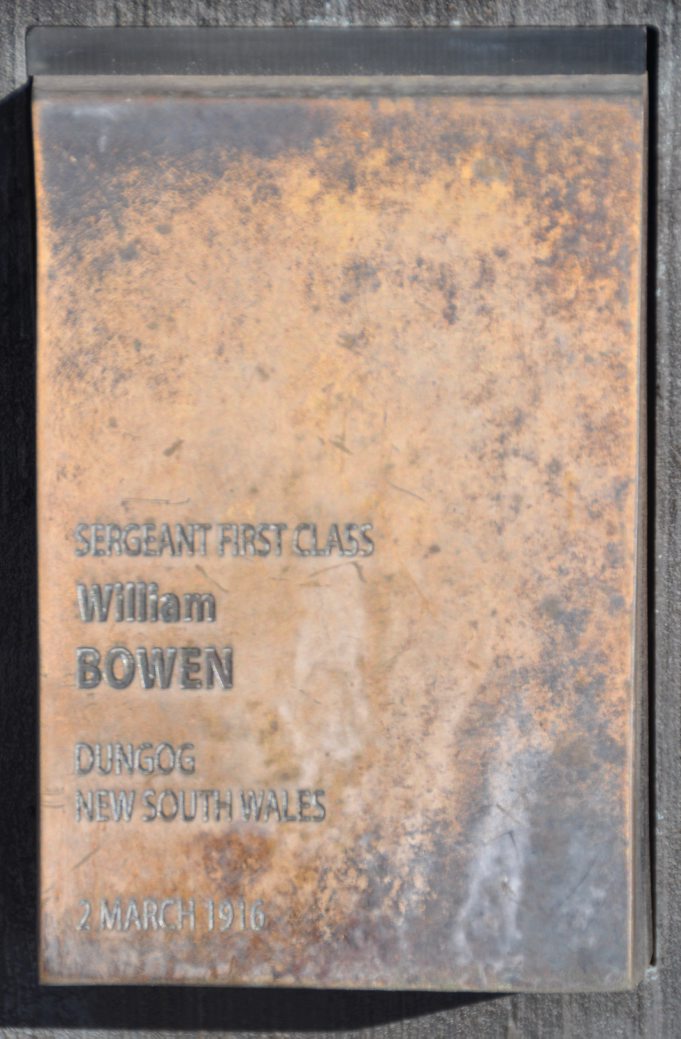
The sergeant suffered serious internal injuries at Dungog when he was assaulted after detaining a mentally ill man in January, 1916. The sergeant had been called to the Dungog Hospital in relation to a violent and disturbed man. He arrested the man and took him to the local police station. Shortly after their arrival at the station the man again went berserk, kicking the sergeant and attacking him with a chair. The sergeant was taken to hospital for treatment and was eventually admitted to Sydney’s St Vincent’s Hospital where he died.
The Sydney Morning Herald of 7 March, 1916 reported news from Dungog to the effect that “The funeral of Senior Sergeant Bowen, of Dungog, who died at St. Vincent’s Hospital. Sydney, on Saturday, took place here yesterday, being one of the largest that have taken place at Dungog.”
The sergeant was born in 1859 and joined the New South Wales Police Force on 14 January, 1887. At the time of his death he was stationed at Dungog.
** officially recorded as Thursday 2 March 1916 but correct death date appears to be Saturday 4 March 1916. Date of Death on the grave stone also is 4 March 1916.
Dungog Chronicle
Tuesday 7 March 1916 p 2 of 6
Death.
Senior Sergeant Bowen
It is with deep regret that we record the death of Senior-Sergeant William Bowen, of Dungog. It will be remembered that deceased, who had been ill a short time, was taken to Sydney on Friday last ( 3 March 1916 ) to consult a specialist. He was accompanied by Mrs Bowen, and was conveyed to St. Vincent’s Hospital, and several specialists, including Sir Alex. McCormack, were called in consultation, but these were unable to diagnose the cause of the trouble, and an operation was recommended, as soon as he was strong enough to bear it, but the patient did not rally, and he passed away early on Saturday morning ( 4 March 1916 ). Such a sudden ending was totally unexpected, although it was noticed that the Sergeant had been failing for some time past. He thought he was a victim to acute dispepsia, but there was evidently something more seriously wrong.
Deceased was born at Uralla, 56 years ago, and had been 30 years in the service, the past nine years he had been stationed at Dungog. Previously he had been at Gloucester, Paterson, Minmi, and other places.
He was a very painstaking, conscientious officer, who discharged his duties with the utmost impartiality. He was very considerate to the men under him, and only those who were acquainted with him intimately knew what a very kind and thoughtful man he was, ever cheerful under the most adverse circumstances, and apparently never harboring an ill-thought about anybody. He will be hard to replace.
He leaves a sorrowing widow and three daughters ( Mrs J. Hunt, Mrs O. E. Carter, and Miss Myra Bowen ) to mourn their loss, to whom we extend our sincere sympathy.
His remains were brought from Sydney on Saturday ( 4 March 1916 ) and interred beside those of his only son ( who was killed at Minmi a few years ago ) and his youngest daughter Alma, in the Church of England cemetery.
The funeral took place on Sunday afternoon ( 5 March 1916 ) and was one of the largest ever seen in Dungog. The pall bearers were Sergt. Haynes ( Paterson ), Constable Capp ( Gresford ), Constable Vaughan ( Clarence Town ), and Constables Parker and Bates ( Dungog ).
The chief mourners were his two brothers, Tim ( Uralla ), and John ( Newcastle ), his brother-in-law Mr Reece ( Homebush ), and Mr O. E. Carter ( son-in-law ). Local justices and townspeople followed the chief mourners, walking, and then came a long cavalcade of vehicles and horsemen. The burial service was conducted by the Ven. Archdeacon Luscombe, who paid a fitting tribute to the memory of deceased at the graveside. Amongst the numerous wreaths sent was a beautiful one from the bench of magistrates and one from the local police.
I have been unable to find any reference to the assault upon William Bowen within Trove as of 15 Jan. 2016.
Cal
NSW Registry of BDM
Birth = 6811/1858 ( possibly )
Death = 359/1916
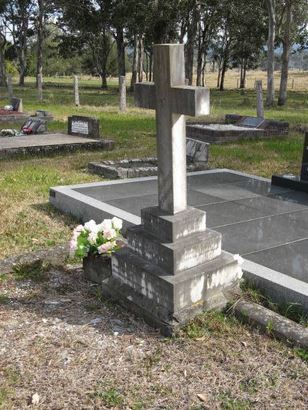
** The person responsible for the assault upon the Sgt was Mentally Ill and sent to the asylum in Newcastle several days after the assault / death.
A Commemoration Day and Plaque Unveiling at Dungog Police Station will happen at 11am on Friday 4 March 2016 for Senior Sergeant William BOWEN.
Police Court On Monday last, before Mr McDougall, S.M., John Dwyer, of Dungog, was charged with stealing about 40 pairs of *naves ( *possibly the central part of a wheel; hub ), valued at £10, the property of Mrs K. B. Walker. Sgt. Bowen represented, the police prosecution ; Mr Borthwick appearing for the accused. Dwyer pleaded guilty and was fined £10, with a fortnight to pay. in default two months in Maitland goal. The fine would be reduced to £5 if the naves were returned to the owner within a week.
Two Men Shot
BULLAHDELAH SENSATION.
Superintendent Childs, of the West Maitland police, received a message from the police at Bullahdelah on Tuesday, giving brief particulars of a sensational shooting incident at the Crawford River.
The message, which came from Constable Sturgiss, stated that Walter John Edwards, 35 years of age, had shot Frederick Soorley, wounding him in the back. He also shot his father, Henry Edwards.
Edwards, who was stated to be apparently insane, is at large, armed with a shot gun. He is described as being 5ft 7in. high, of medium build and having a fair moustache.
Upon receipt of the message, the Superintendent immediately despatched information to all police stations in the locality.
Later.
Superintendent Childs received a telegraphic message from the police at Bullahdelah, stating that the man Walter John Edwards, who was wanted in connection with the shooting sensation at Crawford River, had been arrested between Bullahdelah and Bungwahl. After the shooting, Edwards cleared off, armed with a shot gun. He was charged with shooting with intent to murder, and with maliciously wounding. Arrangements were also made to prefer a charge of lunacy against him. He is stated to have previously been under mental treatment.
Another message from Bullahdelah states that Mr Edwards, sen., was not shot, but was attacked with a tomahawk. The insane man was found hiding in blackberry bushes and they were set alight. He then came out and was captured. Edwards had put his gun down and could not find it again, otherwise there might have been a casualty amongst the captors. The news of the shooting spread rapidly and upset the whole district. People from the Crawford River and other parts left their homes and went to Bullahdelah for safety. The news of the capture of Edwards was a great relief all round.
It will be remembered that Edwards was in Dungog Hospital some years ago and caused a sensation. He went partially insane and smashed up things generally. When the police were securing him at the Hospital he savagely assaulted the late Sgt. Bowen, breaking his hand with a chair.
REMINISCENCES BY WALLY IRWIN
‘DODGER’ EDWARDS
………….
May I refer to another Edwards, an old schoolmate, ‘Dodger’ Edwards ( Walter John EDWARDS ). He was a super lad also. There were 50 odd pupils at school at Bendolba and some of them up to 18 years of age. Not one of them ever brought down Dodger in a game of football. When the ball went to Dodger it was a ‘try.’ Most times the football was made of rags. Our coach then was Mr. Gardiner, our schoolteacher. I think he replaced Mr. Lord, father of Mr. Dick Lord, of Dungog.
In later years, Dodger left our district and went to Gloucester to live. One evening he left Gloucester River to come over to Salisbury on horse back. He got bushed between Whispering Gully and Flag Staff. He unsaddled his horse and to this day the horse was never found. But ‘Dodger‘ came through. I think the trials experienced slightly derainged his mind.
The late Sgt. Bowen was called to the hospital and nearly met his death from a blow that Dodger gave him by hitting him over the head with a chair.
Some two years later, the late Anthony Hudson, his son Tony, and the late Les Middlebrook and I were out beyond Flag Staff and a horse neighed. Old Tony said: ‘Did you hear that,’ We all did, and we were sure there was a horse somewhere. It was over three weeks before we got that horse to mate up with ours. Eventually we succeeded in bringing that horse back. He was a real outlaw, but it was Les Magennis who mastered him. I think this horse was sold later to a circus. I have never solved the problem; was the horse Dodger’s, or whose was It?
…….
http://trove.nla.gov.au/ndp/del/article/140534498
Dungog Senior Sergeant William Bowen
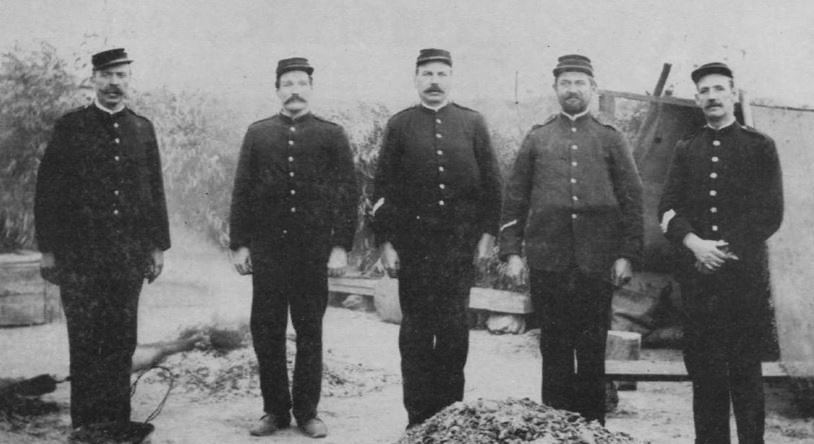
BELINDA-JANE DAVIS
A Dungog policeman who suffered serious injuries on the job and died a century ago will be remembered in a special ceremony.
Senior Sergeant William Bowen suffered serious internal injuries when a mentally ill man kicked him and attacked him with a chair at Dungog Police Station in December 1915.
He had arrested the man at Dungog Hospital a short time earlier, after reports the man was being violent and disturbing staff and patients.
Sergeant Bowen, 56, was taken to hospital for treatment, but never fully recovered from the incident.
His failing health led him and his wife to travel to St Vincent’s Hospital in Sydney on March 3 to see a specialist.
Several specialists, including Sir Alex McCormack, assessed him but were unable to diagnose his condition.
They suggested an operation when he was feeling stronger but Sergeant Bowen continued to deteriorate that day and died in hospital unexpectedly the next morning.
NSW Police Force Commissioner Andrew Scipione and deputy commissioner Catherine Burn are expected to attend a ceremony at Dungog Police Station on March 4 at 11am, which will mark 100 years since Sergeant Bowen’s death.
NSW Deputy Premier Troy Grant and Dungog community groups will also attend and witness a plaque being unveiled, which will commemorate his service.
The Dungog Chronicle recorded Sergeant Bowen’s death on March 7, 1916, saying he would be “hard to replace”.
“He was a very painstaking, conscientious officer, who discharged his duties with the utmost impartiality,” the article said.
“He was very considerate to the men under him, and only those who were acquainted with him intimately knew what a very kind and thoughtful man he was, ever cheerful under the most adverse circumstances, and apparently never harboring an ill-thought about anybody.”
Sergeant Bowen’s body returned to Dungog on March 4 and he was buried in the town’s Church of England Cemetery on March 5 alongside his only son, who was killed in an accident at Minmi a few years earlier, and his youngest daughter Alma, who died of an illness.
It was one of the largest funerals the town had ever seen.
He was survived by his wife, three daughters, Mrs J Hunt, Mrs O.E Carter and Miss Myra Bowen, his two brothers John and Tim, and his brother-in-law Mr Reece and son-in-law Mr O.E. Carter.
Dungog police Senior Constable Mitch Parker said Sergeant Bowen, who was born in Uralla in 1859, joined the police force on January 14, 1887 and spent 29 years serving the region at Gloucester, Paterson, Minmi, Dungog and other stations.
He spent nine years in Dungog before his death.
Senior Constable Parker urged anyone who wanted to pay tribute to Sergeant Bowen’s service to attend the ceremony.
The story Policeman who died a century ago to be remembered first appeared on The Maitland Mercury.
DUNGOG MARKS POLICEMAN’S DEATH 100 YEARS ON
His name adorns the National Police Memorial, but until recently, the death of Dungog policeman William Bowen a century ago went unrecognised in the town he called home.
The restored headstone at Sgt William Bowen’s grave site
Posted
Restoration work has been completed on the grave site of Sgt William Bowen, who died on March 4, 1916 after being attacked on duty at Dungog in the NSW Hunter Valley.
Commemorating 100yr anniversary of officer’s death in the Hunter
The New South Wales Police Commissioner Andrew Scipione will be in the Hunter Valley today to commemorate the 100-year anniversary of the death of a Dungog police officer.
Sergeant William Bowen died on March the 4, 1916, three months after he was attacked by a mentally ill man who had barricaded himself inside Dungog hospital.
Today the commissioner will attend the unveiling of a plaque in his honour.
The man had barricaded himself in the committee room, ordered that all patients be killed in the hospital, and then armed himself with surgical instruments.
Snr Constable Mitch Parker, Dungog Police
Dungog police officer, senior constable Mitch Parker, said sergeant Bowen suffered serious injuries as he bravely tried to protect the Dungog community in December 1915.
“There was a patient of the Dungog hospital who had smashed a number of windows and items within the nurses quarters and a wardsman attempted to restrain him and he got viscously assaulted,” he said.
“Police were sent for and the sergeant, who was living in the police lock-up which we still have today, went up the hill to the hospital.
“By this stage the man had barricaded himself in the committee room and he ordered that all patients be killed in the hospital, and then armed himself with surgical instruments of the day — mostly steel and glass.
“Sergeant Bowen, who was 55 years of age at the time, had been in the police for 30 years, forced his way into the room.
“He successfully arrested and apprehended the male, notwithstanding some injuries himself,” he said.
“They brought him back down to the police lock-up and his health just deteriorated from there.
“Several months later he was sent to St Vincent’s Hospital and was seen by a world-renowned surgeon. Unfortunately he passed away in St Vincent’s Hospital before they could ascertain what was wrong with him.”
Senior constable Parker said as part of today’s commemoration, restoration work had also been carried out on sergeant Bowen’s grave.
“With assistance from the Commissioner’s office, the NSW Police Force and Police Association of NSW, we’ve had the original stone-makers who created the gravesite back in the day have restored it.
“It’s quite a long story, but the sergeant’s been put to rest beside his 15-year-old daughter and 20-year-old son who died five years prior, in pretty horrific circumstances themselves.
“So his grave has been redone and we’ve got the plaque unveiling here at the station,” he said.
“There’ll be the police commissioner coming up, and other important people from different agencies, community groups, schools.
“There’ll also be a lot of retired police from the area, who’ve worked here, finished their service and remained in the area.”
